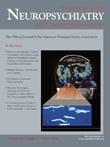To the Editor: Aripiprazole is the first partial agonist dopaminergic D
2 with clear antipsychotic effect. Many schizophrenic patients will develop comorbid substance abuse. Cannabis consumption may worsen psychotic symptoms of schizophrenic patients.
1 We describe the case of a schizophrenic patient whose use of cannabis and related problems disappeared after treatment with aripiprazole.
Mr. A, a 33-year-old Caucasian patient with schizophrenia, has since his mid-20s been treated with olanzapine, 20 mg/day, and escitalopram, 10 mg/day. He did reasonably well with this regimen but was apragmatic. He frequently used cannabis every day (urine screen for tetrahydrocannabinol [THC] was positive). He was moderately obese (BMI: 28) but had no other medical problems. He lived in a community house, in which nurses ensured that he was compliant with treatment. His Brief Psychiatric Rating Scale (BPRS) score was 52. Before his mid-20s, the patient was treated successively for different classic antipsychotic conditions (i.e., haloperidol, bromperidol, and pimozide) and he reported increased cannabis abuse concomitant with these regimens.
Aripiprazole, 15 mg/day, was added to his treatment regimen. After 1 week, the olanzapine dose was decreased to 10 mg. One week later, olanzapine was discontinued. After 5 weeks, escitalopram treatment was discontinued because the patient was euthymic. Three months later, the patient signaled he felt very good and did not need cannabis anymore. After 12 months of treatment with aripiprazole the patient had not relapsed and did not use cannabis at all (urine screen did not reveal any THC). Moreover, his BMI was 24 and BPRS score decreased to 40.
This case report highlights different proposals about mechanism of action and side effects.
First, the concurrence of the diminution of cannabis consumption with the patient’s treatment with aripiprazole suggests that aripiprazole contributed to the occurrence of this diminution. Different mechanisms may have played a part, such as aripirazole’s partial agonism at dopamine D
2 receptors.
2 A similar observation was made with cocaine dependence.
3 Dopamine stimulation in the nucleus accumbens has been suggested to cause addictive behavior and aripiprazole’s partial dopamine agonist effect in this area may reduce this behavior.
4 In addition, aripiprazole has a number of serotonergic actions that are not related to dopamine potentially modulating the response to THC.
5,
6 Other mechanisms may be involved and Mr. A’s rapid cessation of cannabis use after starting aripiprazole suggests the need to verify these mechanisms systematically and to plan controlled trials.
Second, several factors have to be considered when regarding why there may be a concomitant increase in substance abuse with the older antipsychotics. It was suggested that a strong antagonist effect at the dopamine D
2 receptors in the nucleus accumbens was involved in concomitant increase in substance abuse with old antipsychotics.
7 Moreover, unrelated to dopaminergic mechanisms, the use of certain antipsychotics with substantial side effects by schizophrenia patients may actually contribute to greater substance use in an effort to self-medicate the side effects.
8,
9Finally, there could be at least two explanations for the weight loss. The reduction of cannabis use may have contributed to a reduction in eating,
10 and the switch in the antipsychotic to aripiprazole may have been instrumental in such a significant weight reduction, since aripiprazole is weight neutral and olanzapine is known to facilitate weight gain in patients.
To our knowledge, this is the first reported case of aripirpazole’s effect on cannabis use. More research is needed to establish the benefits of aripiprazole in regard to cannabis. Some dual diagnosis patients may benefit from aripiprazole, which may reduce craving for and use of cannabis.

